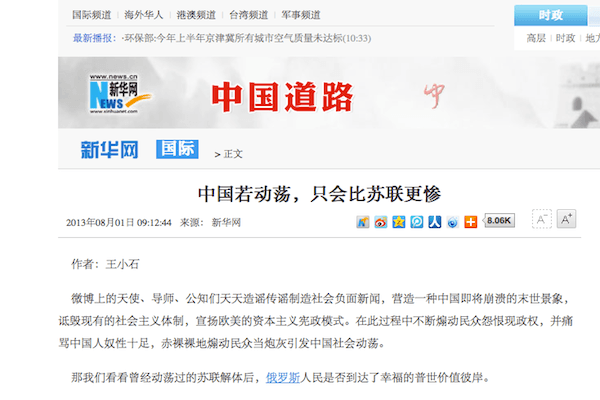An article published on the front page of Xinhua, China’s state mouthpiece, on Thursday warned that if “turmoil” ever came to China, it would be worse than the collapse of the Soviet Union.
The reference to turmoil was taken to mean any move to a democratic political system, or the loss of power of the Chinese Communist Party.
“Those angels, mentors and well known people who have malicious motives, if you want to provoke turmoil in China by controlling public opinion, you’ll have to step over my body,” the author, Wang Xiaoshi, wrote towards the end of the diatribe. “I won’t let you succeed as long as I live!”
Many public intellectuals were “slandering the current socialist system,” the article said, while promoting the subversive ideas of capitalism and constitutional government through social media. This, the author said, incites resentment of the current regime, and provokes social unrest.
“Coldly look at you Western world’s slaves, you cheat people on the internet every day, you deceive Chinese people and allow others to bully China, making China poor and its military weak. You are dogs of the U.S. You bring shame and disaster to China,” the author wrote.
“After the Soviet Union collapsed, have Russian people reached the shore of happiness?” the author asks. Much of the rest of the article is in the form of one long “no.”
The article, which was nearly 5,000 words long and marked a new volley in the propaganda war against liberal intellectuals, was soon reproduced by other Party mouthpiece media in China. Liberal-minded netizens and intellectuals, the villains of the piece, looked upon it dimly.
JumpMan2013 commented, “Whoever says China would be worse than Soviet Union, please ask Russian people, and see if they would like to go back to the reign of terror??????”
Netizen Laoyouwoo attempted to show that Russia isn’t all that bad. “Please look at how miserable Russia is: 1. Universal free medical care; 2. Free preschool, elementary, and secondary vocational education, plus free lunch; 3. Women can receive pensions at 55 years old and men at 60; 4. What’s worse is that the Russian people can vote.”
Chinese netizens also argued that the article evaded the real social issues of the day. Yu Jianrong, a well-known academic and the director of the Social Issues Research Center at the Chinese Academy of Social Sciences, a state-affiliated think tank, said: “Let’s talk about who will lead China into unrest first. Isn’t it the bigwigs that made the gap between rich and poor larger?! Isn’t it the uncontrolled political power that creates injustice in society?! Isn’t it corrupt officials that ruin morality?! You don’t look at these, but only criticize people’s speech. What’s your motivation?”
A large number of cases of official corruption have been reported online and through social media in recent years, and while the Party says that it is currently attempting to weed out corruption, it has typically not welcomed any involvement in that task from the citizenry. “The authorities just want to silence common people and keep us in a cage,” a Weibo user calling himself Louzhushuodedui wrote.
“If China follows the Soviet Union’s old path, but doesn’t have that many resources, what are Chinese people going to eat?” Wang Xiaoshi, the Xinhua author implored readers. “How many times more miserable is China going to be? Did you prepare cotton coats for winter? Can you and your family live through winter?”




